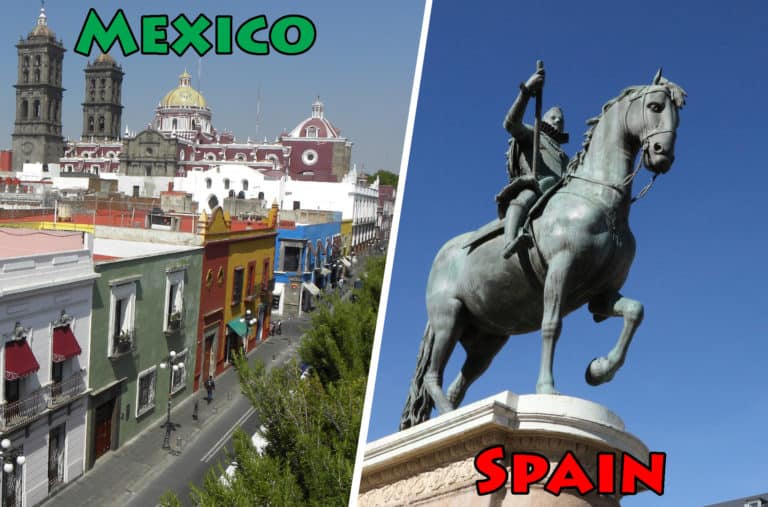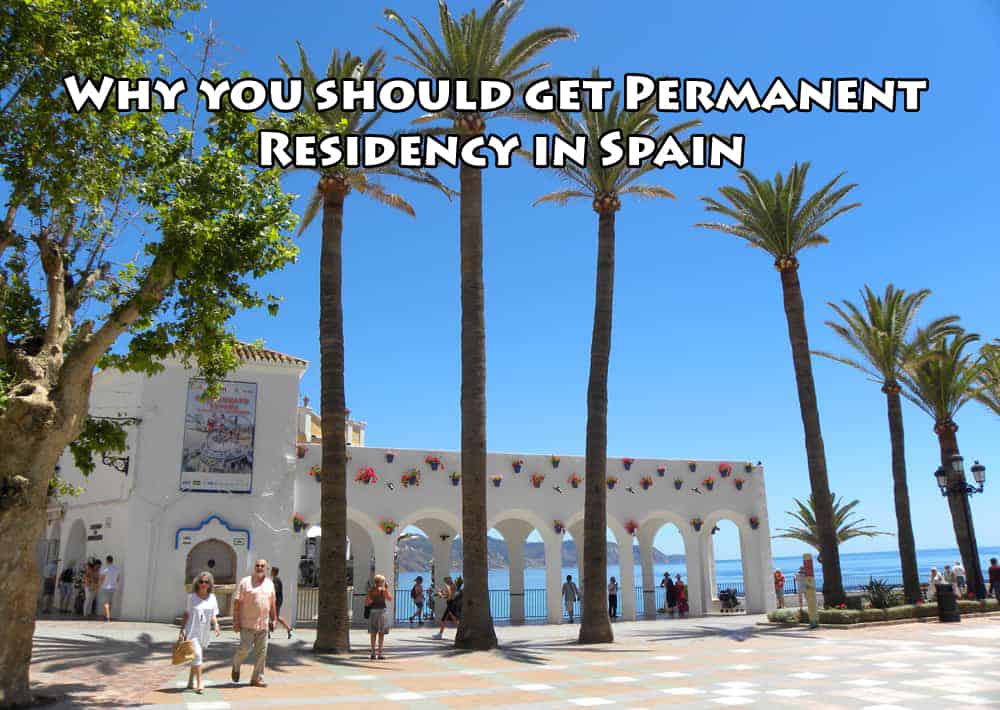Mexico or Spain?
Updated August 2024.
Mexico is the top retirement destination for Americans and Canadians. I know a lot of people who retire there, including my mother who decided to make Mexico home after 10 years in Thailand.
But Mexico isn’t for everyone. Some people (like us) decided to retire in Spain, one of the most popular European destinations for North Americans. But isn’t for everyone either.
This post will compare Mexico and Spain as retirement destinations, weighing the Pros and Cons of each.
I’ve asked Jen, a Canadian expat who’s lived in Mexico, to contribute her thoughts. She’s looking to leave Mexico for Spain.
I weigh in my own opinions further below. I’ve lived in Spain for a few years now but I go to Mexico every year (as I say, my mom lives there) and I’ll admit that there are things about Mexico I really like. Would ever consider living there? Maybe…
There’re no right or wrong answers here, the country you prefer to live in will most likely depend on what’s most important to you. Feel free to share your thoughts in the comments section at the bottom of this post.
Thoughts on Mexico from a Canadian expat living in Mérida
Jen and her husband left Calgary in 2020 and moved to Mérida. We ‘met’ on the blog earlier this year when she indicated that they would be looking to move to Spain within the next few years. It led to a wider discussion of “Why Spain? What’s wrong with Mexico?”.
I asked her some specific questions on that subject.
Hi Jen! You’ll lived in Mexico a year now. Can you tell us the Pros of Mexico as a retirement base?
Asides from the affordability of Mexico, obviously the number one Pro is the weather. Where I live in Merida the summers can be a challenge but honestly I do not find it as bad as some people make it out to be. Even at its hottest we can still have lovely evenings spent outside either waiting on a patio for supper or walking in one of the many parks around the city. Another pro: there are so many activities to do, just last week we did a tour that took us out at night onto the ocean to a small island so we can see the bioluminescence. Scuba diving is easy to get to from here. We are just a four-hour bus ride from some amazing diving in Isla Mujeres.
Health care here so far has been amazing, and easy to find. My husband needed something done and from doctor to procedure it was just a couple of days which is great (note: we are both 51 and pay $250/month to VUMI for the two of us).
I think when considering a place to retire you need to find a place that feeds your mind – exploring the history and museums here is great for that. The local art scene is thriving so you can always find things to feed your mental appetite.
We also enjoy that Merida has many of the same amenities as in Canada when it comes to retail, maybe one day we will live somewhere that does not have the usual stores. But as our first move away from Canada it was important to us that we knew some of the companies we were buying goods from.
How about the Cons of Mexico as a retirement base. What don’t you like or have had a hard time adjusting to?
The biggest con I have, and some people will come at me for this, is that I was amazed how quickly I got tired of Mexican food. Is it amazing? YES. Can I eat it on a regular basis? NO. Here food from other countries is just not great. An example would be Chinese food. Here it is not good, and it being not good is a common thread in some online expat groups here. I have traveled all over this world and had food from all over the world so yes I can compare Chinese food from China, Canada, the US and even Chinese food made in France.
Another one is the trash and this may be odd but also things like sidewalks*. There is no continuity in the sidewalks here, Centro is beautiful but such uneven sidewalks and such makes it not a great place for older people. I have witnessed people fall and have so myself. In a lot of places that is just not a worry. Trash is an issue as well.
*Editors note: bang on about the sidewalks. For old people (including my mom living in San Miguel de Allende), the uneven sidewalks and cobblestoned streets are a real danger.
Another is transit. Basically nonexistent here in Merida, there is a national bus that is decent for taking to other parts, we have to Cancun a few times now, and they are currently building a train so we shall see how that changes things.
Lastly safety, although Merida lists high on a world index for safety other places here in Mexico so not. We have had local friends tell us that they did not even feel safe in Playa Del Carmen and Tulum recently. Although I know that crime exists in Europe I just know for us it will be a safer choice as we never intended to stay forever here in Merida.
You’ve mentioned Spain. Why Spain? How do you see your life in Spain and how do you think it will be different from your reality in Mexico?
One of the reasons for moving to Spain is the language. I have been learning Spanish for some time now and will continue as long as I am in Merida so it makes sense to me to move to another Spanish-speaking country. Also, something we love about European cities are the transit systems. Europe in general just has a better transportation system within its cities and how easy it is to get to other countries and cities by train. Also we have been looking already at real estate there along the Mediterranean Sea and find it a lot more appealing that ocean living here in Mexico. We want to find a beach town with good access for us to travel all over Europe. It would be easy for us to not have a car. We envision active days of exploring with weekend getaways to other places. That will be the biggest thing for us, having getaways to other countries. Could Spain be our forever? Who knows. We still have the thought that one day we may live in Japan, Thailand or Vietnam. Life is short and I am going to live loads of places on this beautiful planet.
Thanks Jen!
My perspective as someone living in Spain
We’ve lived in Spain now for almost 4 years. But over the last 10 years I’ve also done a lot of travelling around Mexico. My perspective has also been shaped by my mother who lives there.
Things that pop to mind when comparing the Spain to Mexico.
The Pros of Spain as a retirement base
We’re in Europe. We can be anywhere on this continent within a few hours, visiting some of our favorite cities and countries. We love travel and we love variety so for us that’s a big thing. Europe is incredible …and that includes Spain which has tons of history and amazing highlights.
Healthcare. One of the best and most affordable medical systems in the world. Note: we’re both 57 years old and pay 56 Euros/month each for our private coverage which basically covers us for anything (as we found out, it even covers our yearly dental cleanings). Foreigners have the option of switching to the public system after a year of temporary residency – a great thing if you have any existing pre-conditions where you can’t get private coverage. It’s known as Convenio Especial. If you’re under 65 you’ll pay 65 Euros/month, if you’re over 65 you’ll pay 157 Euros/month. That’s the maximum you’ll pay for healthcare in Spain.
The important thing is that you won’t go bankrupt in Spain because of an accident or unexpected operation.
Safety. We feel safe in Spain (and Europe in general). Sure, things happen: there are break-ins, pickpocketing (mostly in the bigger cities), and squatters*. But you can walk just about anywhere at any time and you’re safe.
*Did you know that a squatter can come and occupy your home in Spain and you can’t have him/her/them evicted? You’ll probably have to pay them thousands to leave your home. It’s crazy and one of the most ridiculous things I’ve seen anywhere. See this article.
Infrastructure & Cleanliness. Spain is a 1st world country with good infrastructure. High speed trains crisscross the country, the medium and large cities have large airports with plenty of international connections, highways are modern and plentiful. Spain can be considered “clean” by most comparisons – I remember on my most recent trip coming back from Mexico taking the bus from Malaga to Nerja and thinking “wow, I never realized how clean Spain is”. Spending 3 weeks in a developing country will do that to you.
People. Maybe “People” shouldn’t be on my list of comparables. The Spanish are welcoming and open-minded. As much as the Mexicans? Maybe not, the Mexicans are in a whole other league of friendly. But I wanted to mention that Spanish really are very hospitable and tolerant people. I don’t know any other nationality in Europe that matches them.
The Negatives of Spain
The biggest problems most foreigners have with Spain are related to taxes and bureaucracy.
Taxes. The greatest complaint I get is about taxes and most of the complainers are Americans. Tax rates in Spain are much higher than in the United States and Americans choosing to reside in Spain will most likely have to file taxes in Spain and pay extra to the Spanish government on the incremental tax rates. More here: Do Americans and Canadians living in Spain have to file taxes?
The other tax topic that people always bring up is the Wealth Tax. Some good news: as of September 2022 there is no longer any wealth tax in Andalusia. Expect that to spread to other parts of Spain as governments try to attract more wealthy investors.
Still, Spain is not a welcoming place when it comes to taxes. So if you’re even thinking of moving to Spain you should do some tax planning in advance to figure out if it’s worth it to you.
Red Tape. Retirees thinking of starting businesses (either ‘real’ or online) are often frustrated by the bureaucratic red tape and expenses involved in Spain. If you want to be self-employed, for example, you are subject to the autonomo rules which require you to pay social security to the government (about 300 Euros/mo, no matter if you make any money from your business) and present quarterly VAT returns to the Agencia Tributaria (the government tax agency). And you still have to pay taxes which start at 19% and can go as high as 47%. For many people, it’s just not worth even thinking of opening a business.
Service: People complain about service in Mexico which I always find odd (everything is always open in Mexico, even on Sundays). But maybe that’s because I live in Spain where, in addition to poor service (customer service? What is that?), businesses close between 2 – 5 pm, banks literally work “banking hours” (closing at 2pm) and few businesses work on Sundays (even on Saturdays most businesses close around 2 pm).
Immigrating to Spain: It’s complicated and requires you to apply from your home country. It requires a lot of paperwork, economic means, and you might not be able to work in the country for 5 years (depending on the visa). It’s not easy. See my Guide to the Spanish Non-Lucrative Visa.
The Pros of Mexico as a retirement base
Mexico is vibrant. It strikes me every time I go to Mexico. It’s younger, the people are hardworking, markets are colourful. It’s much more business friendly with lower taxes and less bureaucratic red tape. People are welcoming and always willing to talk. There’s an energy that you don’t see in many places…and it never shuts down. When you leave Mexico you somehow feel that the ‘energy dial’ in your brain has been turned down.
The Food. Fantastic food everywhere. One of the world’s great cuisines and one that is also vegetarian-friendly (unlike Spain).
The Cost of Living. You can live much cheaper in Mexico than you can in Canada, the US or even Spain.
Related: Jen on her cost of living in Mérida (Mexico)
Related: Our cost of living in Nerja (Spain)
Closer to home. For many people being closer to home (ie. the US or Canada) is a huge thing. You’re also in the same time zone. I admit one of the things I miss living in Spain is watching my North American sports. I wish I could watch a hockey game in prime time.
Immigrating to Mexico: Much easier than Spain. You can get temporary residence upon arrival in Mexico (and work in Mexico!) and after 4 years apply for permanent residency. Or, if you intend to retire in Mexico (and not work), you can get Mexican permanent residency right away (like in Spain you have to show economic means. But unlike Spain you don’t have to wait 5 years to get permanent residency). More info on immigrating to Mexico.
The Negatives of Mexico
Healthcare. And this all depends on your perspective. If you’re American you’ll probably find private health care in Mexico very affordable and of excellent quality. If getting insurance, expect to pay about $150 US/mo in your 50’s (which can go to $500 US/mo in your 60’s). Many people feel better getting health insurance to cover them for “the big stuff”.
For the “little” stuff, Mexico has a lot of private clinics that are very affordable. My mom has gotten checkups, massage treatments and physiotherapy and it’ll often cost about 900 pesos or $45/US per visit. Medication is also quite affordable. Pharmacies also usually have a walk-in clinic attached to them which are also inexpensive.
Have a look at this video which discusses private health care and costs in Mexico (note: the video is a year old and my mom is of the opinion that costs listed are understated. Pad the costs in the video a little).
As I say, it all depends on your perspective. Canadians or Europeans will find the cost of private insurance and operations in private hospitals very expensive. An operation that includes an overnight stay in a hospital might cost you about 50,000 pesos (or $2500 US) for example if you don’t have any insurance coverage. If you have anything serious the costs can add up fast.
Mexico does have national healthcare but it’s not great and many services are often limited to the bigger cities. You might have to wait a very long time for treatment. For many retirees, as well as Mexicans with the means, national healthcare is not an option.
And what do you do when you’re over 70 and can no longer get coverage from insurance companies? Or if you have pre-existing conditions and can’t get private insurance or IMSS?
This post covers the different heathcare options available in Mexico. It does a good job giving you an overview but again, prices are outdated. Add about 25% to the prices listed there.
My point: healthcare can take a big chunk out of your retirement budget if things go wrong. That’s a scary thing and (from where I’m sitting) a big negative about choosing Mexico as a place to retire.
Safety & Corruption. The media exaggerates the dangers of Mexico. Still, chances of being mugged or broken into are higher than in Spain. Personally, my biggest fear when it comes to Mexico is who to turn to when something does happen? I keep hearing stories of police and/or lawyers who turn a blind eye when retirees have issues with crime.
Mexico is a developing country. There’s a huge wealth disparity, lots of poverty, towns/cities can be downright ugly. It can get to you after a while.
Homogeneity and distances. I mentioned that I love the variety in Europe and the ability to be in a European country that’s totally different in hours. As much as I like Mexico, I don’t know if I could take just being in Mexico all the time. I know it’s a huge country and I know there’s a lot of diversity between regions. But in comparison to Europe, one part of Mexico is very similar to another part of Mexico. And you have to do so much travelling to get anywhere – my mom for example lives in San Miguel de Allende. It takes 5 hours to get there from Mexico City. In Spain I could have flown to Prague and be on my 2nd beer in that time.
For me, right now, it’s a big negative.
Sometimes it’s the little things. Lissette is curious about Mexico and she wasn’t too fazed when reading the above. Until I mentioned not being able to flush your toilet paper. “What?! I can’t flush toilet paper? I don’t think I could live with that!”
Summing it up:
When I think of Spain I think developed, safe, friendly people, European history, great wines, tapas, old population, bureaucratic, not business friendly and economically stagnant.
When I think of Mexico I think exotic, dynamic, young, great cuisine, developing, incredibly friendly people, unstable (as opposed to unsafe). A country of the future.
The above are what come to mind to me when comparing Mexico and Spain. They’re both great countries to retire for different reasons… but neither place is perfect and what’s best for you might depend on what you’re looking for and/or what you can’t live with.
Your thoughts – Mexico or Spain?
Related: The Best & Worst places for Expats (2023)
Related: Why you should get Permanent Residency in Spain
Related: Where to live in Spain as retiring expats? Choosing our base…








an interesting comparison. I have already thought about the possibility of retiring somewhere other than Australia although it may still be at least 15 years off. And I’m in a situation without that much saved or indeed property to my name which you know, is something I’m planning on doing in the next 12-24 months. but I dont think either country would appeal too much to me. well, Spain more than Mexico although I can’t really compare as I am yet to visit Mexico. Europe is big on quiet Sundays, that’s for sure but I think it better promotes a bit of quiet and relaxation in life which isnt a bad thing and you just plan around it. In the bigger cities much is still open like large malls, but once out of the bigger cities you might in places that just don’t bother at all, I recently passed through Beziers on a Sunday and frankly, it was a total ghost town. great post as always!
All I am saying, is that an “average” (regular) worker (earning around $50,000 or less) in both Canada and the USA (after all things are taken into consideration)…won’t pay much of a difference, in taxes, etc., at the end of the day.
Once one get’s into the higher, professional, salary ranges (ie: $100,000 and up)…then things may begin to separate between the two countries to a certain degree.
Don’t forget, many regions of both Canada and the USA still pay rather low wages, and the vast majority of workers are earning a LOT less than the figures you are mentioning here. Most regular folks are in the low-ish income tax brackets and thus don’t pay very much tax in either location.
I currently reside on Vancouver island, and I think you would be quite shocked at how low the “average” regional wages are, even in the BC Provincial capital – Victoria. Using professional, high-level salary levels as an anecdotal indicator – example, is not presentative of the general population.
Many people here earn a wage of just $20 per hour (or even less) and thus have a gross annual income of less than $40,000 CDN per year. Such individuals obviously pay very low taxes after all appropriate exemptions, etc.
When one figures into the high cost of decent US medical coverage it sure evens out the net disposable monthly income levels between the two “majority” population groups in both countries.
Yes, some Canadians do indeed pay more in taxes than Americans…however, a lot also do not.
Plus of course (to date) the USA has high inheritance taxes…whilst Canada still doesn’t.
Until the next time 🙂
Tell you tax advisor that he’ll be hearing from my tax advisor Kevin 🙂
…as an add-on to my initial comment,
I must admit, I am rather biased as my wife (of 40 years) is a Greek-Canadian, plus I’ve lived in Israel for several years and also have family there…so I connect with the eastern Mediterranean far more than the west, from an ethno-cultural and psyche perspective.
However, having said that…I have always also felt that the “east meets west” (Asia/Europe) Eastern Mediterranean persona & ambience is a lot more interesting and vibrant than the Iberian Peninsular region.
Southern Spain obviously has a lovely Mediterranean climate as well, and it does have one major weather advantage-factor over both Italy or Greece…and that is the winter (NOV thru FEB) season is significantly drier/brighter/sunnier.
From Alicante on down…all the way to Almeria, Malaga and to Marbella enjoys the warmest/sunniest WINTERS in continental Europe. with noticeably higher sunshine hours than in Greece.
For example, the Alicante to Malaga coastline receives approx 180 to 200 sunshine hours in Dec/Jan/Feb….whereas in say Chania (Crete) or even Rhodes…that figure drops to only approx 120 hours per month.
It gets a lot less rain too, obviously…
Which makes quite a difference.
The temps are very similar (around 15-18°C) but Greece has a lot more inclement days at this time of the year than Spain does.
In fact, even on Crete it can get downright cold for a week or two at a time.
Greece is effected by a cold weather front that drops down from southern Russia and/or central Turkey during the winter months, so that eastern part of the Mediterranean gets quite a bit of unsettled, stormy, wet weather.
This is precisely why Greece has never become the retirement HUB that Spain has for Brits, Scandinavians, Germans, etc.
Southern Spain during the winter months rivals Tel Aviv or Haifa in Israel for sunshine hours, although the ocean surface (water) temp in Israel is warmer (around 20°C) and one can often still swim quite comfortably at this time of year.
Thank you very much Kevin for adding this here. I totally agree of course 🙂
I’ve spent a lot of time in Mexico (especially in the 1970’s and 80’s) and it was a lovely place to spend the entire winters during that era. The Pacific Coast and Yucatan beaches are very good. Plus, the Acapulco to Puerto Escondido Pacific side (NOV thru May) with it’s completely dry/sunny winter climate season is absolutely perfect.
But, there simply is no comparison to Europe and especially the southern Mediterranean region. It’s by far the most popular international travel destination on the planet and for very good reason.
For me, the Mediterranean has all the required ingredients. A lovely (mostly sunny/dry) climate. Fantastic history, antiquity, architecture, interesting cultures, diversity of languages, amazing local cuisines, the arts, music, plus a relaxed, safe, politically stable, social environment.
Oh, and did I mention the “ambience” 😎
However, having said that…Spain is not my favourite place on the Mediterranean. It’s way too meat/fish orientated for my (50+ years) of being plant-based (vegan) and cruelty free.
To be honest, I have always been truly disappointed with Spanish food.
Greece and Israel are (by far) MY go to countries in this region…plus the local cuisine in the eastern Mediterranean is way nicer/better/healthier and is mostly (naturally) vegan to begin with. Crete and Rhodes are fabulous destinations.
…and,
https://youtu.be/-nqaWbeEpxM
The food in Tel Aviv is incredible…
Plus, the Greek island beaches are second to none during the long April thru October season…and the local hospitality is a national treasure.
Just my 2 shekels worth…
Two years ago, I could see Spain as a viable choice for us, for long term retirement location. Now that costs have risen so much, I don’t really see Spain as a viable choice even for 90 days in winter. We have decided that living in winter, in a warm place, 10-12 weeks is probably our best choice. With rotating locations so we can see more of the world. Europe is expensive. Mexico and SE Asia is less than half the cost of Europe. Is it a perfect plan? No, because nothing is perfect. But at least, we won’t have to endure negative temps for weeks at a time.
Much of why we chose Spain came down to 1 thing: where can we get permanent residency and maybe live out our years? Because long-term, we don’t want to go back to Canada: too cold and too expensive. If I went back I’d probably have to join the work force again and just don’t want that. We live a comfortable life in Spain and could as well (as I say, the biggest worry for me would be Medical in Mexico).
But if permanent residency anywhere is not a goal then why settle on 1 spot? The idea of rotating locations sounds good to me 🙂
Hi Frank!
I completely agree with you regarding the medical in Mexico. While you can get some decent medical care here, the quality varies widely. Being used to a medical system that is free and that works well, I am very uncomfortable with having to “shop” for a doctor. In most of these expat places in Mexico, including San Miguel, the english speaking community has an almost mob-like mentality when it comes to recommending doctors and dentists alike, i.e, so and so is “the best” . The recommendation is often based on the fact that said professional can speak some english.
The expat communities like SMA and Lake Chapala have attracted less than stellar medical services and is a real minefield for the retiree.
You are 100% right Anna. My mom lived in SMA and she’ll say exactly the same. Hit or miss, some good, some bad…
Hi Anna,
Yes, I think the quality of medical care is a HUGE factor when considering a “retirement” location. In fact, I’d say, it should be right at the top of everyone’s wish list.
When we are young we just travel to many places overseas (including the developing, 3rd world nations) and we really don’t give it much thought, simply because serious health issues are not on our radar nor part of our psyche.
Then suddenly (usually around age 55 or so) things start to go wonky and all kinds of medical issues can start to crop up.
At that point, 1st world medical all of a sudden becomes a necessity/priority, plus also the ability to obtain good insurance coverage at a reasonable cost, etc.
I also notice, that in some locations around the globe it’s nye impossible to actually obtain medical coverage once one is over the age of 65 or 70, so that’s also something definitely to think about too.
Despite being a life-long competitive, long-distance, runner and very active, athletic guy (plus eating a very healthy plant-based (vegan) diet for 46+ years) I required an emergency Aorta Heart Valve replacement at age 59 a few years back. Luckily, I was residing in Victoria BC at the time, and had access to one of the best cardiac centres in Canada.
IF I’d been living in Mexico, Thailand, etc., or most other developing nations (like when I was younger) I would probably be DEAD now.
As much as I like Mexico, Thailand, Sri Lanka, Malaysia, and so forth…today, I wouldn’t even consider anywhere other than a first-world destination for retirement. So, in that case, it would have to be Europe (ie: the Mediterranean region)…so Spain, Southern France, Italy, Malta, Greece or Israel for me.
Just MY 2 shekels worth..
Agree with you Kevin. The thing that worries me (including for my mother who lives in Mexico): past 70 she can’t get coverage. So what to do if something serious happens? She can go back to Canada (if she’s in condition to). After years of having left the country she will have lost her provincial coverage. She’ll have to rent an apartment and wait until she gets her coverage back.
I ask her what her American friends do. They say they can go back to the US if there’s an issue and get healthcare under the Medicare program.
So she “self insures”, the term they like to use. Which basically means “pay out of your own pocket”.
It always amazes me that we lose our Canadian healthcare despite still filing and paying taxes…
I live in Scandinavia so I too am looking for warmth in the winter. Spain is the cheapest alternative for me though I have spent time in Uruguay, which is not expensive. I have heard Ecuador is nice and they use the US $, which some people find convenient. It is becoming more attractive to expats.
Luckily there are many options out there.
Hi John,
Whilst Europe is overall more expensive than say Mexico or SE Asia (ie: Thailand, etc)…the “long stay” prices differences are a lot less than one might think.
Plus, Mexico and SE Asia are fast becoming noticeably more expensive these past few years and in many cases are now almost inline with southern Europe…especially during the European winter off-season.
Even India (places like GOA, etc) the costs are rather surprising these days…and it’s no longer a truly “cheap” winter destination any longer.
For example, a nice, decent, comfortable beach bungalow in southern Thailand these days will easily run around $600+ USD per month and up….and one can easily find a “long-stay” apartment rental in Andalusia or Crete for that amount during the winter OFF season…plus, in Cyprus too.
Yes, you can of course get cheaper in SE Asia, but those real cheapie places are just glorified shacks and not very nice these days.
Plus food prices have also gone up a lot at the popular winter destination in SE too, and not a whole lot cheaper than southern Europe, these days. I’m actually rather surprised just how much some of the online digital TRAVEL nomads pay for food/accommodation in Asia now…
Sure, it won’t be as hot in the southern Mediterranean region as it is in Asia, plus one cannot swim much in the ocean…but, for a long-term stay, I think the prices are not too far apart, especially, IF one is staying put in one place…and just hanging out, relaxing, cooking meals at home, and not travelling around too much.
Slightly off topic but I couldn’t resist: One thing I do not get with Americans (or Canadians it seems) is the constant complaining about taxes, especially taxes on wealthy people. Why do you think health care is affordable and infrastructure “excellent”? Because of rich people paying taxes. It really is that simple. But somehow Americans have been (mis)led to believe that all taxes are bad and destructive. Most people benefit from higher taxes as long as the taxation system is progressive and the money wisely spent on things like health care, education and infrastructure.
Thanks RJA. Canadians pay high taxes so its not an issue there. But Americans don’t so it’s a “sticker shock” situation when they hear about the high tax rates in other countries. BUT, on the other hand, they’re used to paying a lot for health insurance which is something Canadians and Europeans would never accept.
But yes, I get tired of hearing Americans calling Canadians “Socialists” because we pay high taxes. We all pay taxes, where’s the line to becoming a “Socialist” society? And in the end, adding what they pay for healthcare, it probably all evens out. And like you I don’t mind paying higher taxes for infrastructure and to help the least fortunate in society. It keeps our cities safe.
Actually, that’s somewhat of a myth.
If you factor in the BIG picture…many Canucks actually pay less in taxes than their US counterparts do.
Plus, all Americans living overseas have to double file each year and must report to the IRS, which often results in being double taxed…or part thereof.
Depending on their financial situation, etc.
The USA is the only nation in the world that requires this of their (permanent) overseas citizens.
One of my American expat friends (who lives on Vancouver Island) just recently gave up her US citizenship because of this very reason.
Overall, the US and Canada tax levels are very comparable.
See here:
https://www.investopedia.com/financial-edge/0411/do-canadians-really-pay-more-taxes-than-americans.aspx
I don’t agree with you Kevin. The 37% tax rate you quote kicks in at about 550,000 of income. Between Federal and provincial tax rates in Quebec I was paying about 40% of income taxes on $200,000 about 10 years ago. And the article does mention the out of pocket healthcare costs as partially filling the gap differential (as I mention). As I say, include the healthcare you come closer. But to say Americans pay equivalent income taxes is erroneous.
And yes, all Americans have to file taxes overseas. Lissette is American so we have to file taxes for her every year. Doesn’t mean she pays more taxes though, most countries have a tax treaty with the US (almost all developed countries anyway). So you’re not paying double taxes. Yes it’s a pain having to file and yes we’ve considered exactly what your friend did…but it doesn’t mean paying more taxes.
Well, as mentioned…it all depends upon one’s individual circumstances.
The vast majority of American and Canadian workers earn a LOT less than your $200,000 personal example here. The base income tax up to $55,000 in Canada is just 15%. In the USA it’s about 14%, virtually the same.
Plus, both countries also have the personal tax exempt portion to also consider into the equation.
Up to $100,000 income bracket (where the vast majority of people fall) the Tax structures are indeed very similar.
https://www.taxpolicycenter.org/fiscal-fact/us-vs-canada-tax-revenues-breakdown
Also, I would think…that most US and Canuck regular retirees living overseas would have very similar basic pension incomes.
With regard to my American friend…she did pay US taxes every single year (for 27 years) whilst living in Victoria BC. As a property-rental business owner (5 large heritage houses)…she was partial double taxed by the IRS every year…plus, she was also subject to US capital gains taxes each time she sold a property, etc.
Then of course there were her local IRS accountant fees – each year on top of that.
She didn’t actually care about filling to the IRS each year, it was the thousands of double taxes that she strongly objected to as a dual US/CAN citizen living in BC.
Thus she finally denounced her US citizenship just a few years ago.
Thanks Kevin. I don’t think we’ll agree on this. The link you’ve provided is about the revenues the government gets, not what individuals pay (lots of variables there, including larger tax base in the US).
I do agree that it depends on someone individual circumstances. Most people won’t have to pay extra – Lissette is a US citizen who worked 20 years in Canada and had to file in the US but never paid a dime in taxes (On $100,000 US in salary she paid more taxes in Canada than she ever did in US). Capital gains, RRPS, IRA’s – they’re are differences that are accounted for differently be that in the end might end up making you pay extra. But is that true for the average person?
One thing for sure: paying $2000/yr to a tax accountant to file zero balance taxes is too much. And we’re also looking to save on that. So she’ll probably be renouncing in the next few years as well 🙂
Exactly! American here. Americans forget to include the additional “technical taxes” that are paid through insurance premiums (especially for health, home and auto). And when claims go up, insurance companies can leave states or just charge all of its customers more in premiums to cover the costs (sounds like market base socialism).